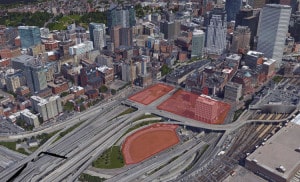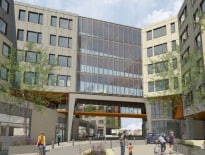You know the saying that doing the same thing over and over again and expecting different results is the definition of insanity?
Well, our state government’s long string of spectacular failures trying over and over again to cash in on potentially valuable Boston development sites also serves as a pretty good definition of sheer stupidity.
Case in point is the Massachusetts Department of Transportation’s efforts to find a buyer for a hardscrabble, highway-bound, 5-acre site near South Station just off Kneeland Street on the edge of Chinatown, currently home to a 1930s steam plant, a state office building and a neighborhood basketball court.
While lots of developers looked at the request for proposals sent out by state transportation officials, not a single one submitted a bid for the site, which had been on the market for a minimum of $167 million.
Apparently perplexed by the lack of interest, state officials have said they are going to go back to some of the developers who expressed interest but never bid to see what the turnoff was.
For veteran observers of Boston’s development scene, this should all sound awfully familiar.
Back in 2004 as it wound down the Big Dig, the Massachusetts Turnpike Authority announced plans to sell the Kneeland Street acreage in hopes of getting as much as $100 million for the land.
Turnpike Chairman Matt Amorello – remember him!!! – announced that December with great fanfare plans for Boston’s second-highest tower, a 67-story skyscraper that would serve as a sort of southern gateway for the city. But the whole thing was a sham, with just one bidder, a local development firm that had never built anything remotely resembling the 3.1 million square foot behemoth that was proposed.
That plan mercifully faded from sight, with state transportation officials trying – and striking out again – in 2012 to sell part of the site.
Apparently thinking the third time would be the charm, the Baker Administration recently decided to try again to sell at least part of the Kneeland Street site, now redubbed “SouthGate,” a variation, I guess, on the “southern gateway” idea former Turnpike chief Amorello blathered on about more than a decade ago. The idea this time was to sell 5 acres, or roughly half of the original 10-acre site.
Despite the smaller offering, at $167 million the price was a good $67 million higher than what the Turnpike had been looking for the entire site more than a decade ago.
But that’s not all. The successful bidder was also supposed to build a deck over I-93 northbound; a new steam plant for Veolia, the operator, while cleaning up any contamination at the old site; rebuild the park/basketball court; and meet a 20 percent affordable housing requirement for the project.
Go figure – it’s hard to imagine any developer biting at a lopsided deal like that. And like they have done after past attempts to sell the site went nowhere, state transportation officials say they are going to chat with developers to find out what their concerns are.
Here We Go Again
Unfortunately, the fumbled sale of the Kneeland Street site is not the exception but rather the rule when it comes to efforts by state government to cash in on its considerable real estate holdings in Boston.
State transportation officials have been trying to monetize their control of the air-rights over the Turnpike in Boston for nearly two decades, with nothing to show for it. Instead, the effort has yielded expensive public relations disasters like the years-long battle over the proposed Columbus Center, an upscale condominium and hotel tower that was to have decked over the Pike where the Back Bay and South End neighborhoods meet.
The developers, Arthur Winn and Roger Cassin, spent years bogged down in an unwieldy, twin-track approval process, one run out of the Department of Transportation, the other out of Boston City Hall. There were literally hundreds of community meetings, many of them with irate neighbors, in addition to the endless confabs with city and state officials. The developers finally started work in 2010 only to run out of cash, leaving a big mess behind that took months more to clean up.
Other air-rights projects pitched by state transportation officials have never even gotten that far, and probably mercilessly so.
What explains this dismal track record?
After all, Boston officials have had no real struggles cashing in on some of their other surplus property, with a crumbling Financial District garage fetching nearly $153 million from luxury condo developer Millennium Partners.
Massport has also done very well over the years leasing out land for development in South Boston’s Seaport District.
One answer may be to take a closer look at who is doing such a bang-up job of selling these valuable Boston development sites – the Massachusetts Department of Transportation, better known as the people who brought you the Big Dig.
MassDOT is in the roads, bridges and tunnel business, not in the business of nurturing the development potential of valuable but extremely tricky air-rights sites.
It’s looking for instant cash flow, and none of the sites the state’s transportation bureaucracy controls is going to yield that.
Take your pick as to whether it is insanity or stupidity that has one governor after another – Romney, Patrick and now Baker – trying and failing to wring gold out of promising yet extremely complicated Boston development sites.
It’s time to get MassDOT out of the development business and find some other entity – public or private – that can do the job.




 |
| 




